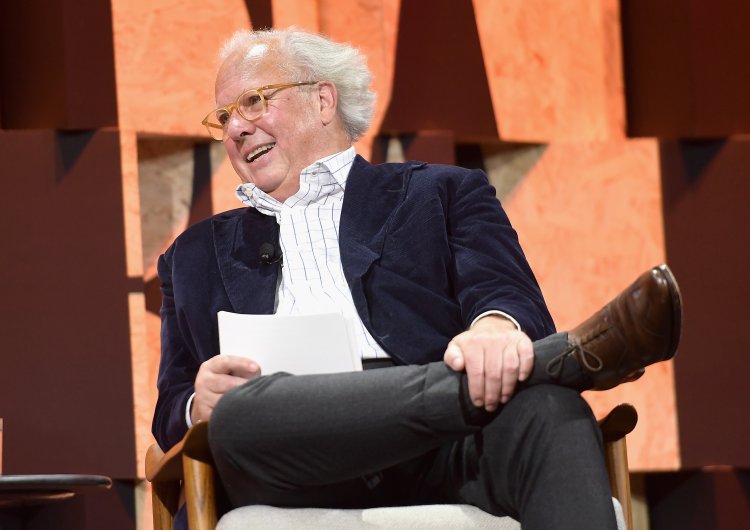Canadian Export Graydon Carter Discusses Trump, Napoleon, and the Canadian Election
The former Vanity Fair editor's legendary feud with Trump has been well-documented. Now, he’s expressing his thoughts on Trump's threats directed at his home country, Canada.

“As they say, a butterfly’s wings,” Carter writes.
Carter, the former editor-in-chief of Vanity Fair, has had a famously tumultuous relationship with Trump. For decades, both have been prominent in New York City social circles and have at times shared a semblance of friendship. Carter was even present at Trump’s 1993 wedding to Marla Maples. However, it was Carter’s SPY Magazine that famously dubbed Trump a “short-fingered vulgarian” in the 1980s, earning him a spot as one of Trump’s favorite targets on X, formerly Twitter.
Although Carter has lived in the U.S. for nearly 50 years, his upbringing in Ottawa remains evident in his new book, When the Going Was Good: An Editor’s Adventures During the Last Golden Age of Magazines. His Canadian roots and formative experiences there allow him a unique perspective on both Trump and his significant influence on Canada’s upcoming election. Since Trump’s election last year, he has made bold statements about potentially turning Canada into the “51st state” and has imposed considerable tariffs on Canadian steel, aluminum, and automobiles.
In a request for his thoughts on Trump’s threats against Canada, considering his years of observation, I spoke to Carter about the evolving political landscape and the backlash these statements have triggered ahead of Canada’s April 28 election. “Napoleon and Hitler made the mistake of blithely marching into another cold-weather nation,” he noted in an interview with PMG Magazine. “You don’t get through those brutal winters without building up a sturdy resilience. And Canadians can fight and skate at the same time.”
This interview has been condensed for clarity and length.
You discuss in the book your interactions with Trump. Notably, you had his 43 tweets about you framed and displayed outside your old office. What insights about him do you think other journalists might overlook from those years of back-and-forth?
I think that inside every bullying strongman is a coward who is easily manipulated and frightened.
As a Canadian by birth, how should Canada interpret Trump's threats?
I think Canadians should take this lunatic threat seriously. By the same token, Trump should take Canadian resistance equally seriously. Napoleon and Hitler made the mistake of blithely marching into another cold-weather nation during their invasions of Russia. Look how those adventures turned out. Beneath that affable, welcoming exterior, Canadians are remarkably tough. You don’t endure those harsh winters without developing a strong resilience. And Canadians can fight and skate at the same time.
Recent polling indicates a swift shift away from Pierre Poilievre and the Conservatives in favor of Mark Carney and the Liberals since Trump intensified his “51st state” rhetoric. However, Carney himself doesn't seem to be a typical defender of Canada; much of his career has been spent abroad. What’s your perception of Carney, and how do you view the change in polling?
I've met Mark once, and I found that he possesses a charmingly dry sense of humor. Given his extensive experience, I think Trump would be wise not to underestimate him.
Regarding Pierre Poilievre, what do you believe is his appeal, and why has it seemingly waned since Trump re-assumed the presidency?
I believe Trump is tarnishing the brand of strongman populism. In a way, he’s been a boon for liberal democracies worldwide. Observing the current situation in the U.S. may lead Canadians to better appreciate the freedoms and stability they have.
You also recount how a six-month stint working on the railway in Canada as a late teen altered your life trajectory. What insights about your homeland's politics and culture did that experience provide, and how does it shape your view of Canada’s current political landscape?
I was not a child; I was a late teen. I shared a bunk car on the Canadian prairie with 11 other men, most of whom had a history with the law. Working summer jobs in blue-collar positions offered me valuable lessons in understanding how the average worker thinks and how they view authority figures, especially politicians.
How is Canadian media performing in its coverage of both Trump’s threats and the upcoming election? What improvements could American and Canadian media make at this time?
I think that what the far-right derisively labels as mainstream media has been doing an exceptional job during one of the most challenging times for balanced yet incisive coverage. You don't need to present all views on every issue; for example, in discussing the roundness of the Earth, there’s no need to include a spokesperson from the Flat Earth Society.
From yourself to Shane Smith of Vice, numerous Canadians have significantly influenced American media. Why does this happen, and why is it less common in Canada?
Shane is somewhat more American than Canadian. He certainly knows how to talk! I admire Canadians like Lorne Michaels, Martin Short, Catherine O’Hara, the late Robbie Robertson, and Victor Garber. They have come to the U.S. and made an impact while maintaining their cheerful, endearing Canadian identity. They are my friends and role models.
In your book, you elaborate on a golden era of American journalism. Does the absence of similar towering media institutions now complicate the coverage of President Trump?
The initial months must have been grueling for reporters, especially with the rapid succession of executive orders from the White House. It must have felt like trying to catch a cup of water from a fire hose. I do believe that the New York Times has shone exceptionally throughout this period. Moreover, the impressive influence of a nearly 175-year-old magazine like The Atlantic on the news cycle should instill hope in everyone.
Lucas Dupont for TROIB News












